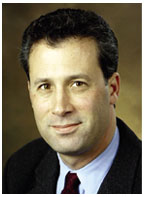|
Web Exclusives: Alumni Spotlight September 10, 2003:
Anthony Marx *90 takes over at Amherst When the trustees of Amherst College hired Anthony Marx *90 last spring to be their next president, they landed an engaged teacher, magnetic personality, and eminent scholar at the top of his career. A professor of political science at Columbia University for 13 years, he is an expert on nationalism, race, and South African politics, and recently published his third book, Faith in Nation (Oxford). The search committee wanted Marx to help Amherst refine its mission of educating future leaders, says Amherst committee member Frederick Griffiths, associate dean of the faculty. Amherst has a social responsibility “to educate its students as best it can for a world that is likely to be difficult and challenging, and to provide some leadership beyond the campus,” says Marx. His view that colleges and universities have an obligation to address society’s pressing problems and to help improve public education struck a chord with the committee. Explains Griffiths, “He’s come to listen and organize the conversation.” Marx says it’s too early to determine what changes he’ll make at Amherst, which has a student body of 1,600 and is located in Amherst, Massachusetts, but he will look at the curriculum, which has just one required seminar outside the majors. One of Marx’s abiding interests has been South Africa, where in the mid-1980s he helped start Khanya College, which, at the time, offered college-level courses to black students who then applied to leading universities. He earned an M.P.A. with a focus on development studies at the Woodrow Wilson School in 1986 and continued doing research in South Africa through 1989, becoming immersed in the black political struggle. “South Africa was on the verge of exploding,” says Marx, who hopes to find time to teach and write as president. “Blacks themselves were divided about how to challenge apartheid most effectively.” His doctoral thesis, in politics, became his first published book, Lessons of Struggle: South African Internal Opposition, 1960—1990 (1992). Much of his career has been dedicated to public education. At Columbia he helped establish the Columbia Urban Educators program, which offers undergraduates free tuition toward a master’s degree at Teachers College in exchange for teaching at urban public middle schools. Last year Marx directed the Gates Foundation-funded Early College/High School Initiative, which creates partnerships between school systems and universities to establish small public high schools for disadvantaged students, offering college-accredited work in the junior and senior years. The program’s goals, says Marx, are to bolster the high school experience, ease the transition to college, and diversify universities. “Universities, as the top of the educational food chain, have a responsibility to address the decay of the system below them,” says Marx. Undergraduates’ approach to their academic work “has
become more professional and less broadly engaging,” says Marx.
Universities and colleges, he says, should “say to our undergraduates:
Stop, take your time, think, learn, explore, imagine.” At Amherst,
he’ll try to come up with ways to reinforce this message. By K.F.G.
Home Current
Issue
Web Exclusives: Headlines - PawPlus - Features Tooke's Take - Varsity Typewriter - Inky Dinky Do Raising Kate - On the Campus - Comparative Life - More... PAW Online Archives - Print Archives - Advertising Info - Reader Services Search the Site - Contact PAW Princeton University - Alumni Links - Alumni Council - Your Class Secretary |
||

